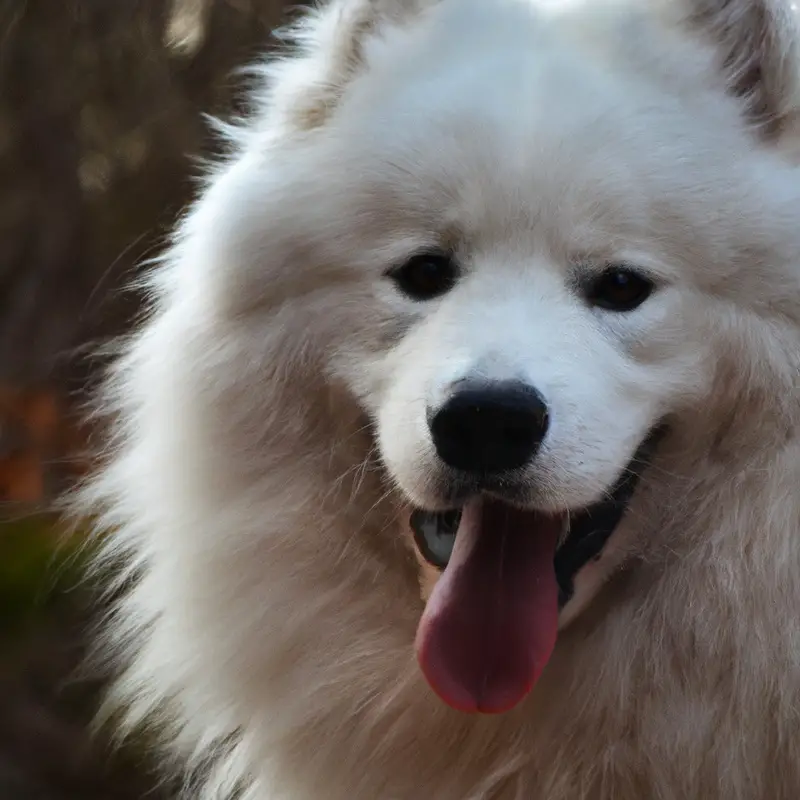Are Samoyeds Hypoallergenic Dogs?
Key Takeaways:
- Yes, Samoyeds are considered hypoallergenic dogs.
- They have a low to moderate level of allergens in their fur.
- While they may not trigger allergies in everyone, some individuals with severe allergies may still react to Samoyeds.
- Regular grooming and cleaning can help reduce allergens and potential allergic reactions.
Are you dreaming of having a dog but worried about your allergies? Well, let me tell you about a breed that has captured the hearts of many – Samoyeds.
These captivating and fluffy dogs are known for their striking appearance and friendly nature.
But here’s the burning question: Are Samoyeds hypoallergenic? In this article, I’ll guide you through the concept of hypoallergenic dogs, the characteristics of Samoyeds, and the factors contributing to their hypoallergenicity.
I’ll also provide valuable insights on dealing with allergies and address some frequently asked questions.
So, if you’re ready to embark on an adventure with these beautiful creatures while keeping your allergies in check, you’ve come to the right place!
| Hypoallergenic Feature | Samoyeds |
|---|---|
| Shedding | High |
| Dander | Medium |
| Saliva | Low |
| Urine | Low |
| Feces | Low |
| Allergenic Protein | Low to moderate |
| Allergy Sufferers’ Reactions | Varies (individual allergies may vary) |
Understanding Hypoallergenic Dogs
What Does “Hypoallergenic” Mean?
“Hypoallergenic” is a term used to describe something that is less likely to cause an allergic reaction.
In the context of dogs, a hypoallergenic breed is one that is less likely to trigger allergies in people who are sensitive to pet allergens.
These breeds often have hair instead of fur, which means they shed less and produce fewer allergens.
However, it’s important to note that no dog breed is completely hypoallergenic, and individual reactions can vary.
If you have allergies, spending time with a dog of the hypoallergenic breed may still cause a reaction, although it is generally less severe.
How Do Allergies to Dogs Develop?
Allergies to dogs develop when your immune system reacts to proteins found in the dog’s saliva, urine, or dander.
These proteins, known as allergens, can trigger an allergic response in sensitive individuals.
When exposed to these allergens, your immune system produces antibodies that release chemicals, such as histamine, causing symptoms like sneezing, coughing, itchy eyes, and a runny nose.
Regular contact with dogs can lead to the development of allergies over time, even if you previously had no symptoms.
Can Certain Dog Breeds be Considered Hypoallergenic?
Certain dog breeds can be considered hypoallergenic to some extent.
Hypoallergenic dogs are breeds that produce fewer allergens compared to other breeds.
They typically have hair instead of fur and produce less dander, which is a common allergen.
However, it’s important to remember that no dog breed is completely hypoallergenic, and individual reactions to allergens can vary.
It’s recommended to spend time with the breed you’re interested in to see if you have any allergic reactions before making a decision.
Regular grooming and cleaning practices can also help minimize allergens.
The Samoyed Breed
Physical Characteristics of Samoyeds
Samoyeds are medium-sized dogs with a sturdy build and a fluffy white coat.
They have a distinctive smiling expression with dark, almond-shaped eyes.
These dogs have a proud carriage and an elegant gait.
Samoyeds are known for their thick double coat, which helps them stay warm in cold climates.
They also have a plume-like tail that curls over their back.
One of the unique physical characteristics of Samoyeds is their ability to produce a smile-like expression, which adds to their friendly and approachable nature.
Are Samoyeds Hypoallergenic?
Are Samoyeds hypoallergenic?
Unfortunately, no.
Samoyeds are not considered hypoallergenic dogs.
They have a thick double coat that sheds heavily twice a year, which can trigger allergies in sensitive individuals.
Additionally, Samoyeds produce a moderate amount of dander, which can also cause allergic reactions.
If you have allergies, it’s best to consider a different breed or carefully manage your interactions with Samoyeds to minimize exposure to allergens.

Factors Contributing to Hypoallergenicity
Shedding and Dander Production in Samoyeds
Samoyeds are not hypoallergenic dogs.
They have a thick double coat that sheds heavily, especially during shedding seasons.
This shedding can lead to a high production of dander, which is a common allergen for many people.
Regular grooming, such as brushing and bathing, can help manage the shedding and reduce dander production.
However, if you have allergies, it’s important to spend time with a Samoyed before bringing one into your home to see if you have any allergic reactions.

The Samoyed Coat and Its Impact on Allergies
The Samoyed coat can have an impact on allergies.
However, Samoyeds are not considered hypoallergenic dogs.
Their thick double coat sheds heavily and can trigger allergies in sensitive individuals.
Regular grooming and cleaning can help minimize allergens, but it may not eliminate them completely.
If you have allergies, it’s essential to spend time with a Samoyed before bringing one into your home to see how you react.

Other Contributing Factors to Allergies in Samoyeds
Other Contributing Factors to Allergies in Samoyeds can include the dog’s skin and coat.
Samoyeds have a thick double coat that can trap allergens like pollen and dander.
Their skin can also produce oil, which can contribute to allergies.
Additionally, Samoyeds have a lot of hair, which can shed and spread allergens throughout the home.
Regular grooming and cleaning can help reduce allergies in Samoyeds.
Dealing with Allergies to Samoyeds
Allergy Testing and Confirmation
Allergy testing is crucial in confirming whether you have an allergy to Samoyeds. A skin prick test or blood test can be done by an allergist to determine if you are allergic to the dog’s dander or saliva.
These tests involve exposing your skin or blood to small amounts of allergens and monitoring your body’s reaction.
By undergoing allergy testing, you can get a definitive answer and take appropriate measures to manage your allergies.
Managing Allergies while Owning a Samoyed
If you have allergies and own a Samoyed, managing your allergies can be a challenge. Here are a few tips to help you cope:
- Keep your Samoyed clean: Regular baths and grooming can reduce allergens like dander and pollen from accumulating on your dog’s fur.
- Maintain a clean home: Vacuum regularly, use air purifiers, and wash your bedding frequently to minimize allergens in your living space.
- Designate pet-free zones: Establish areas in your home where your Samoyed is not allowed, like your bedroom, to create allergen-free spaces.
- Consult with your allergist: They can recommend medication or allergy shots to alleviate your symptoms and make living with your Samoyed more manageable.
Remember, while these steps can help reduce allergens, there is no guarantee that your allergies will completely disappear. It’s important to discuss your options with a healthcare professional to find the best approach for you.
Tips for Reducing Allergy Symptoms
Here are some tips to help reduce your allergy symptoms:
- Keep your home clean and dust-free, especially your bedroom where you spend most of your time.
- Invest in allergen-proof bedding and pillowcases to prevent exposure to dust mites.
- Vacuum regularly and use a HEPA filter to trap allergens.
- Keep windows closed during high pollen seasons and use air purifiers to filter out allergens.
- Wash your hands and face frequently to remove any allergens you may have come into contact with.
- Avoid outdoor activities during peak pollen times and consider wearing a mask if necessary.
Frequently Asked Questions
Do Samoyeds Shed A Lot?
Yes, Samoyeds do shed a lot. Their thick double coat is designed to keep them warm in cold climates, but it also means they have a lot of fur to shed.
Regular brushing can help to minimize the amount of loose hair in your home, but be prepared for some shedding year-round.
Vacuuming and grooming are important to keep up with the fur. If you have allergies, it’s important to note that although Samoyeds have hair instead of fur, they can still trigger allergies in some individuals.
Can Samoyeds Cause Allergies in People?
Yes, Samoyeds can cause allergies in people.
Despite their fluffy and adorable appearance, Samoyeds have a thick double coat that sheds quite a bit.
This shedding can release allergens into the air, such as dander or saliva, which may trigger allergic reactions in some individuals.
Symptoms can include sneezing, runny nose, itchy eyes, and even skin rashes.
If you have allergies, it’s essential to spend time with a Samoyed before committing to owning one, to see if any allergic reactions occur.
Regular grooming and keeping the living environment clean can help reduce allergen levels.
Are There Any Truly Hypoallergenic Dog Breeds?
Are There Any Truly Hypoallergenic Dog Breeds?
Unfortunately, there are no dog breeds that are completely hypoallergenic.
While some breeds, like the Samoyed, may produce fewer allergens, they can still trigger allergies in sensitive individuals.
This is because allergies are caused by a person’s reaction to proteins found in a dog’s skin cells, saliva, and urine.
However, certain breeds, such as poodles and Portuguese water dogs, are known to be more suitable for people with allergies, as they tend to produce less dander and shed less.
It’s important to remember that individual reactions can vary, so spending time with a specific breed before bringing them into your home is recommended.
How Can I Know If I’m Allergic to Samoyeds?
If you suspect you may be allergic to Samoyeds, there are a few ways to find out for sure. One option is to visit an allergist who can perform specific tests to identify any allergies you may have.
These tests may include a skin prick test or a blood test.
Another way is to spend time around Samoyeds and observe if you experience any allergic symptoms such as sneezing, itchy eyes, or a runny nose. It’s important to note that individual reactions may vary, so consulting a healthcare professional is the best way to determine if you are allergic to Samoyeds.
Final Verdict
Samoyeds are not considered hypoallergenic dogs due to their heavy shedding and potential for dander production.
Although they have a beautiful, fluffy coat, it can be a challenge for allergy sufferers.
While there is no truly hypoallergenic breed, some people may have less severe reactions to certain breeds.
If you suspect you have allergies to Samoyeds, seeking allergy testing and adopting strategies to manage your symptoms are crucial.
Remember, it’s always important to consult with a healthcare professional for personalized advice.







